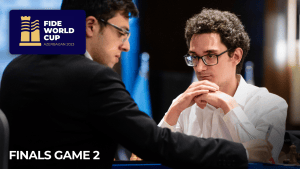
Ding Finds Mating Net In Game 6, Ties Match Score Again
There can be no complaints of "boring draws" in this year’s FIDE World Championship, as GM Ding Liren and GM Ian Nepomniachtchi continued to trade blows in game six to reach the fourth decisive result of the match.
This time it was Ding’s turn to emerge victorious, as he essayed a surprise London System and took advantage of his opponent’s series of positional inaccuracies to gain a winning position, culminating in a mating net that forced Nepomniachtchi's resignation.
After six games, the score is tied at 3-3. Play continues Tuesday, April 18, at 15:00 Astana time (2 a.m. PT/11:00 CEST) after a rest day.
Before the game began, there was speculation regarding whether Ding would be playing for a win or for a draw after Saturday's tough loss. As it turned out, Ding went for—in his own words—a position that was "not so forced ... [with] some possibility to play for [a] win."
When play began with 1.d4 Nf6 2.Nf3 d5, commentator Howell scarcely had time to complete his sentence: "Surely he's not going for the London System" before Ding played his bishop to f4 and left the board.
This marked the first time that the London has been played in a world championship match, although it did not surprise the returning challenger Nepomniachtchi, who said he expected it in one of the games if not this game.
Today's game six in the #NepoDing match is the first time ever that the London System was played in a world championship. I did spot a 'reversed London' in two games: 1.d4 d5 2.Nf3 Bf5 (Botvinnik-Keres, 1948 and Botvinnik-Smyslov, 1954). pic.twitter.com/nQtEOr9X6D
— Peter Doggers (@peterdoggers) April 16, 2023
Nepomniachtchi responded with a lesser-known 6.Bf5, which surprised Ding and took him out of his preparation and down on the clock over the next few moves. However, the position evolved toward a "slow, maneuvering game" in the playing style of GM Gata Kamsky who has reached the same position after 11 moves multiple times in Titled Tuesday events.
The position, with a reversed Carlsbad pawn structure, was well within Ding's comfort zone—something he mentioned in the press conference, comparing it to game three—and soon it was Nepomniachtchi who fell behind on the clock.
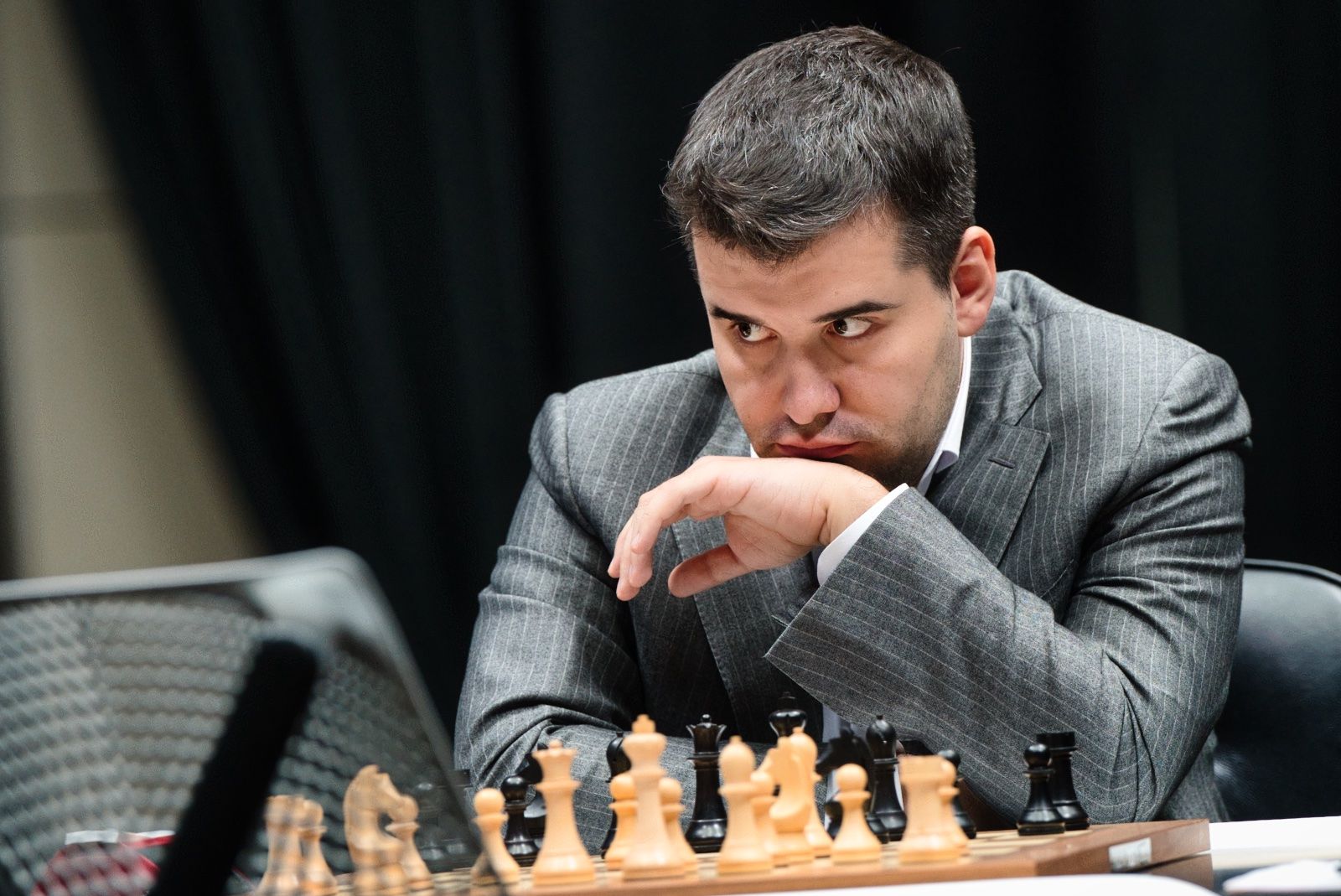
As Nepomniachtchi took his time after Ding's 12.Ne5, his earlier 11...h6 was called into question, with the suggestion from Giri that a queen retreat to c7 may be preferable, since then White's knight could be recaptured on e5 without allowing a fork.
Nepomniachtchi had to retreat his knight to e7 to avoid a "good knight vs. bad bishop" situation and further weakened his position with 13...a6 and 14...Nd7. This string of inaccuracies led to a pleasant position for White as he found 16.a5 to clamp down on Black's dark squares and looked to gain a big positional advantage if he could reach c5 with his knight.
Ding found what he termed "a useful waiting move" with 18.Ra3 and offered a queen trade before pushing his h-pawn forward. While Nepomniachtchi avoided the queen trade and prepared for a central pawn push, commentators speculated that Ding's 21.h4 had been made to create favorable complications should Black decide to capture on a5.
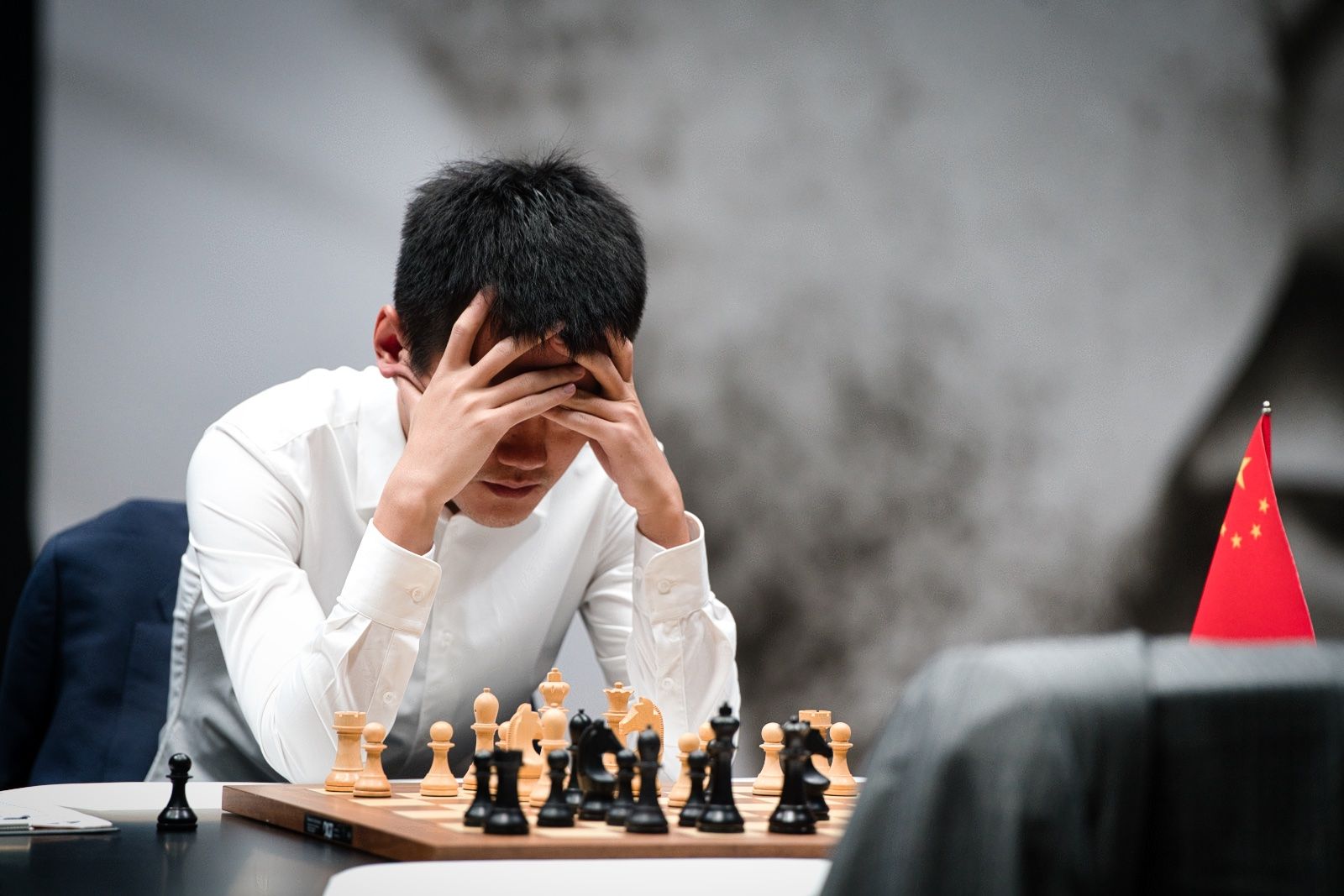
After Nepomniachtchi pushed 22...e5, Ding didn't think for long before playing 23.Rb3. After the game, Ding admitted that this had not been his initial plan, saying: "Maybe I should have played b4 instead of Rb3. Before that, the position was nearly one-sided. I was the one who [put] pressure, and he didn’t have much counterplay, but after e5 Ne5, suddenly he had a lot of counterplay.”
Commentators, too, were surprised by Ding's decision, thinking that the positional advantage was more suited to Ding's playing style than the variation that he had entered into. Nepomniachtchi, who sensed that he had reached near equality, played quickly to keep the pressure on Ding who was burning through his time rapidly. However, his quick moves soon came back to haunt him, as he missed his chance to equalize with the interesting 27...Rxe5 resource.
This time Nepomniachtchi's speed works against him, since it turned out he had a nice tactical resource after 27...Rxe5! Instead he goes for 27...Bc2?!#NepoDing #c24live pic.twitter.com/twl4yzMJ8C
— chess24.com (@chess24com) April 16, 2023
After the game, Nepomniachtchi said that he had missed 27...Rxe5 but that he still identified 27...Bc2 as a mistake, thinking that a move like 27...Bd3 would give him a position that is holdable, if not necessarily equal.
Time management has been a recurring theme in the match, with Nepomniachtchi spending too little time on critical moves and Ding spending too much time in "only move" positions. When asked if his quick moves were due to a lack of patience, Nepomniachtchi responded that it was "not about that." He attributed the loss to "a lot of bad moves made in one game"—which he described as one of his "worst games ever."

Ding found the tactically sound 29.Nd6 but used up a substantial amount of time and ended with just 20 minutes on the clock compared to Nepomniachtchi's 53 minutes—with nine moves remaining until the first time control. The pressure was on Ding to maintain his advantage on the board, and it must have been a welcome relief as Nepomniachtchi slowed down and remained in his rest area until he found the good defensive move 31...Kh7.
Ding Liren's 29.Nd6 was a brilliant move and he has a clear advantage on the board!! #NepoDing
— Chess.com (@chesscom) April 16, 2023
Can you spot why Nepo didn't take the knight? 🧐 pic.twitter.com/GIZN3lHVHZ
Although the engine still gave White a large advantage after 31...Kh7, Giri commented that it was still difficult to see a way for Ding to win and a lot of play was left in the position. Moving quickly, Ding overlooked the "unhuman" 32. Qe1 and instead opted for 32.Rc5. Then it appeared that Nepomniachtchi might be able to hold the draw.
However, instead of correctly grabbing the c3-pawn, Nepomniachtchi checked Ding on c1, which allowed White the quickly-played 33.Kh2 that took him one move closer to the time control in a better position.
Ding missed a strong chance to retain big advantage and our commentator @anishgiri felt that Nepomniachtchi may save the game! #NepoDing
— ChesscomLive (@ChesscomLive) April 16, 2023
Nepomniachtchi returned the favor as he made a mistake on the very next move with 32...Qc1+.
Watch: https://t.co/pJhlWXLBt8 pic.twitter.com/WTJUep6Dkr
While amateur players might have worried as Black advanced his a-pawn, Ding remained calm, using seven of his scarce remaining minutes to calculate 35.Nxc4. He played his next few moves quickly and with computer-like precision. Ding's fans no doubt collectively let out a sigh of relief as he reached the time control in a superior position with less than five minutes remaining on his clock.

After reaching the time control, Ding spent nearly 20 minutes on his next move, finally opting for 41.d5. While this isn't the best move on the board—the stunning 41.Rb7!! is the engine's top choice, while 41.Ng6+ is second—it is still a good move that limits Black's possible responses while setting up a potential mating net.
Test your visualization skills with this variaton:
— ChesscomLive (@ChesscomLive) April 16, 2023
41. Rb7 a2
42. Rb8 a1=Q
43. Rxf8+ Kh7
How does White finish off the game in this variation? #NepoDing pic.twitter.com/QNA8qi2IET
White is making progress while getting more time after reaching move 40. The key is to park his knight on g6. Black has to take then recapture with the h pawn. This way back rank will be a serious problem —> winning endgame. #NepoDing #WorldChessChampionship pic.twitter.com/4uLLF3nf1R
— Susan Polgar (@SusanPolgar) April 16, 2023
Nepomniachtchi pushed his a-pawn within a square of promotion, and a visibly-excited Ding returned to the board to play 42.Qc7 while the commentators searched for the winning continuation. In fact, Giri was unable to find it and the queen sacrifice, calling the combination a "genius" calculation by Ding.
While Ding didn't explicitly agree that it was a "genius game," he said: "I feel very pleased with the ideas...d5 followed by Qc7 [that] I was happy to find." He also said that he had seen Giri's prediction that Ding would come back to level the score after his game-five loss, and he thanked Giri for his confidence in him.
After 44.Qf7, mate was unavoidable, and Nepomniachtchi resigned.
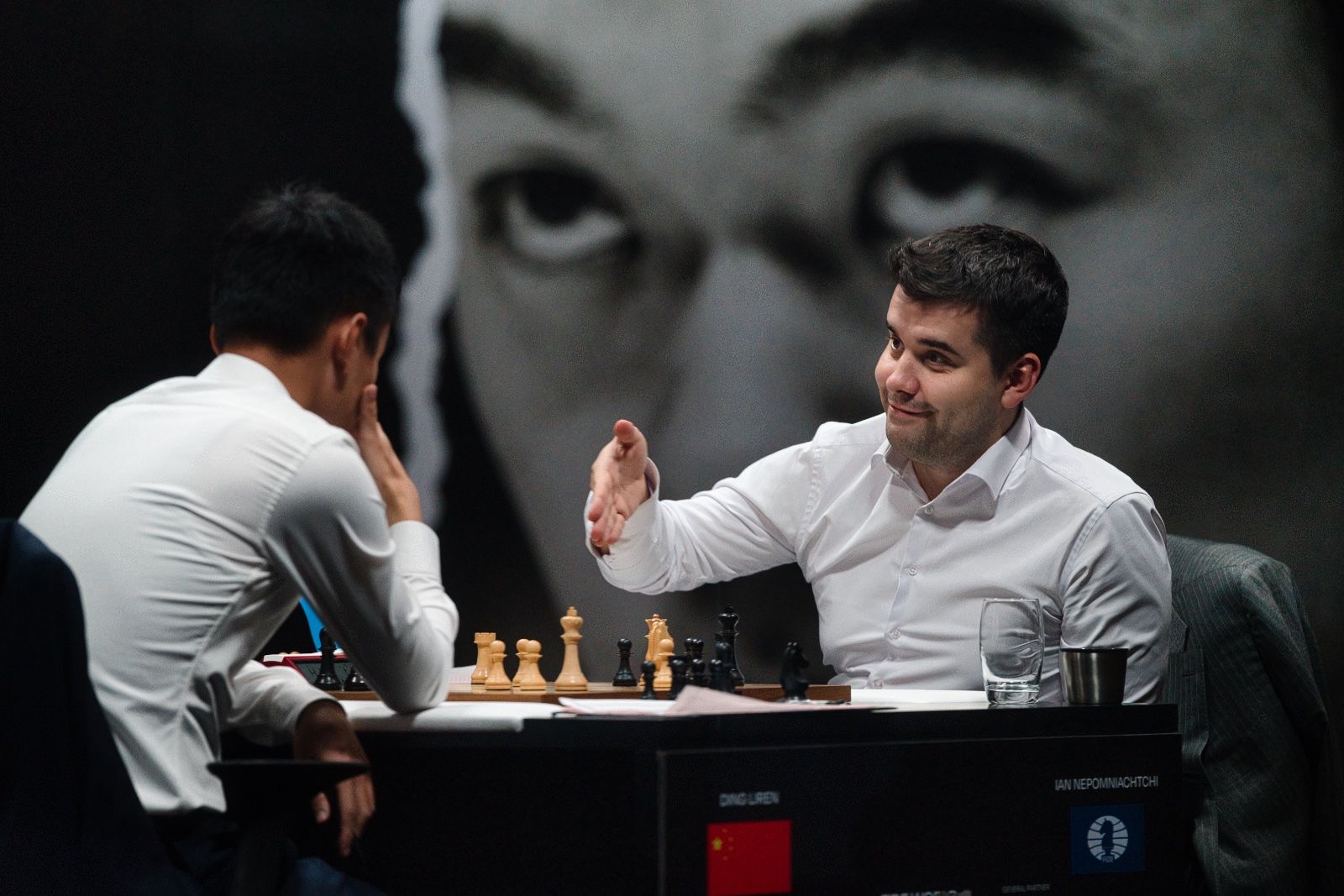
GM Rafael Leitao analyzes the full game below.
You can watch video recaps of the FIDE World Championship in our playlist below (or click here).
Many of the games in this match have been one-sided, but not for the same player. Giri attributes this to the players being "asymmetrically equal"—each one excels in positions where the other does not fare well. There has not been a world championship match this millennium with as many decisive games; the most recent matches with four decisive results in the first six games are Karpov-Anand in 1998 and Karpov-Kamsky in 1996.
When the players themselves were asked why they thought the games were so decisive, Nepomniachtchi responded: "Ask me another day, please." Ding remarked, with a smile, that they are not yet as professional as GM Magnus Carlsen. Ding also mentioned that the decisive results might be attributed to early deviations from long, forced computer lines.
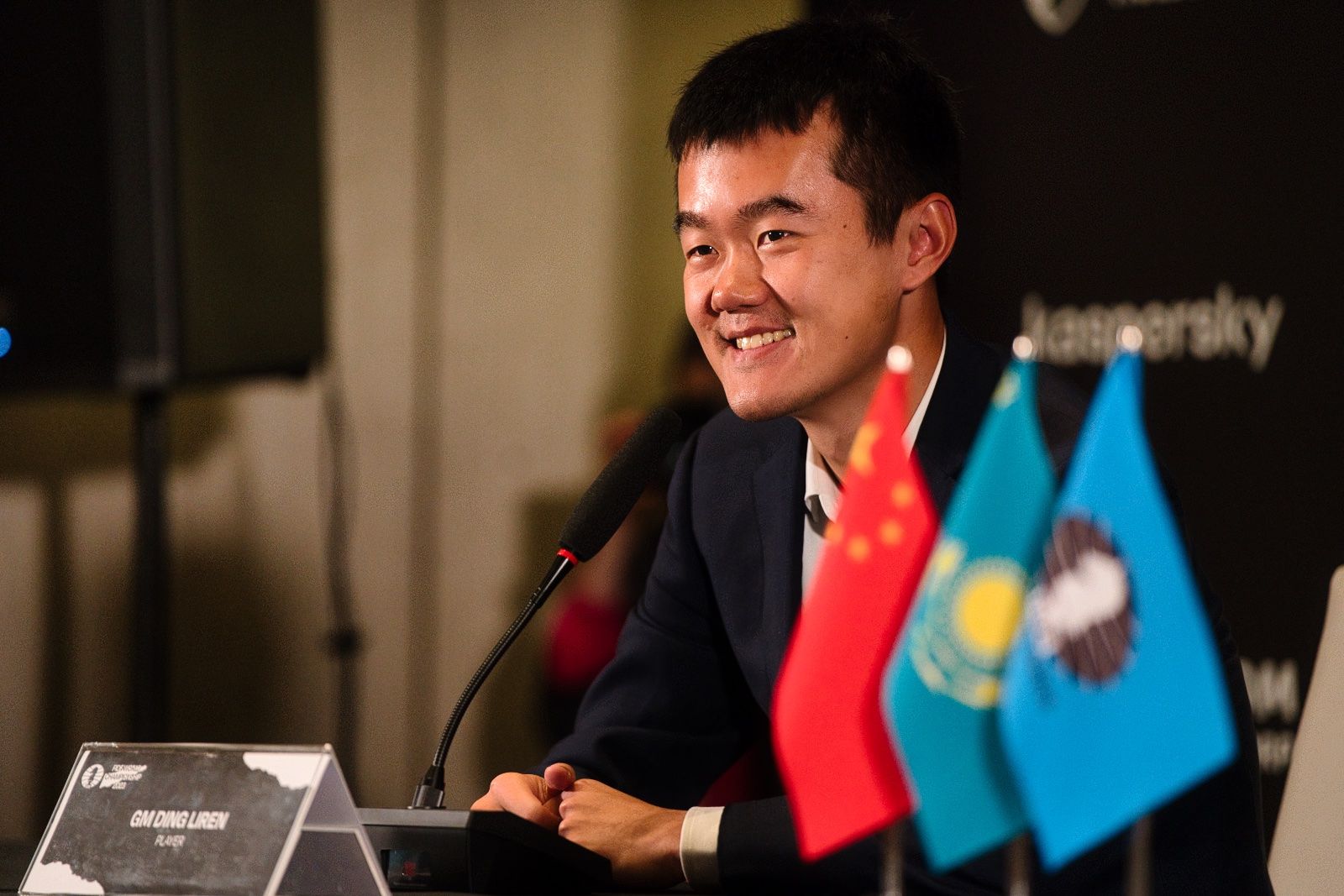
The match is approaching the halfway mark, and both players have to remain in the correct mental state to perform at their best. Ding bounced back well from his fifth-round loss and offered some insight into his resilience. He said that his aim with his opening on Sunday was to play something that he was familiar with and to stay calm after the loss in the previous game.
Ding also said that he felt like he was in good shape throughout the round-six game and that he was "not so influenced by yesterday's loss." It remains to be seen whether he can find the consistency required to pull ahead on the scoreboard for the first time in the match, as commentators expressed some concern over his Black repertoire, but it is evident that he will not go down without a fight.

Nepomniachtchi was understandably upset after his loss and repeatedly referred to how bad his moves had been throughout the game with harsh self-criticism. When asked if overconfidence contributed to his loss, he dismissed the idea, saying: "The tension is high, sometimes you can't perform at your best."
Nepomniachtchi has already demonstrated in this match that he can come back from a loss, and he has more experience in a world championship match than his opponent. He now has a rest day to recover, and we will soon see if game six becomes a turning point in this world championship match.
Match Score
| Fed | Name | Rtg | 01 | 02 | 03 | 04 | 05 | 06 | 07 | 08 | 09 | 10 | 11 | 12 | 13 | 14 | Score |
| Ding Liren | 2788 | ½ | 0 | ½ | 1 | 0 | 1 | . | . | . | . | . | . | . | . | 3 | |
| Ian Nepomniachtchi | 2795 | ½ | 1 | ½ | 0 | 1 | 0 | . | . | . | . | . | . | . | . | 3 |
The 2023 FIDE World Championship is the most important over-the-board classical event of the year and decides who will be the next world champion. Nepomniachtchi and Ding play a match to decide who takes over Carlsen's throne after the current world champion abdicated his title. The match has a €2 million prize fund and is played over 14 classical games; the first player to gain 7.5 points wins.
Previous reports:
- Nepomniachtchi Breaks Away Again, Outplays Ding In Game 5
- Confident Ding Wins Game 4, Levels Match Score
- Ding Holds Nepomniachtchi To Draw In Game 3
- Nepomniachtchi Wins Game 2 With Black After Navigating Ding's Novelty
- Nepomniachtchi Presses Big Advantage In Game 1, Ding Escapes
- All The World Chess Champions
- Meet The Challenger: Ding Liren
- 5 Most Memorable Games Between Ian Nepomniachtchi, Ding Liren
- FIDE World Championship 2023: All The Information


